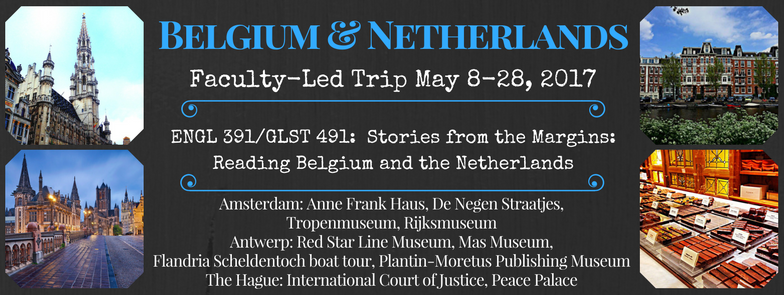
Program Highlights
--Learn about topics such as history, culture, colonization, human rights, immigration, social protest, politics, and various forms of diversity through an interdisciplinary lens
--Travel to and learn in Amsterdam, Antwerp, and the Hague
Tour and visit other central Belgian and Dutch cities including Brussels, Maastricht, Brugge, and Ghent
--Visit and tour Anne Frank House, historic neighborhoods, various museums including art and publishing, take a boat/canal tour through Europe's third largest port, tour the European Councils building and International Court of Justice, plus many more!
Academics
This faculty-led study abroad program will take place over three weeks during UNL's summer session. Through this course and program, students will learn about various literary and political topics ranging from colonization and immigration to political dissidence in wartime. Through participation in this program, students will gain an understanding and appreciation of political, social, and narrative perspectives for understanding human rights, immigration and migration as well as other phenomena of globalization. These topics will be put into context through lectures from various guest speakers, including a lecture on the current immigration and refugee crisis present in the Netherlands and Belgium. In addition, students will have the opportunity to learn from visits to various museums in the Netherlands and Belgium, including the Rijksmuseum, Anne Frank Museum, Plantin-Moretus Publishing Museum, the Red Star Line Museum, and more! Of course, students will also have the opportunity learn about the history and culture of the Netherlands and Belgium through several walking tours and culinary tours!
Course Credit
Students will earn three credit hours for this program for one of the following courses: ENGL 391 - Learning Abroad, or GLST 491 - Special Topics.
Eligibility
All students must be enrolled at UNL during the application process and complete at least 18 credits by the start of the program. Students from other colleges and universities are welcome. Required qualifications are 1) a GPA of 2.75 or higher, 2) essay describing interest in study abroad program. For more information about the eligibility requirements students must meet in order to participate in Education Abroad programs, please review the Eligibility and Conditions of Participation page of the Education Abroad website.
Faculty Leaders
The class will be co-taught and the program co-led by Dr. Emira Ibrahimpasic, Assistant Director of Global Studies, and Kelly Payne, Lecturer and Chief Undergraduate Advisor for the English and Film Studies departments. Kelly Payne and Dr. Emira Ibrahimpašic are educators passionate about the value of international education and dedicated to providing undergraduate students with opportunities to engage both local and global issues. Both are avid travelers who have deep commitments to promoting international education.
Kelly Payne is an Undergraduate Advisor and lecturer in the Department of English. In her doctoral research, she studies the intersections of economics and race in national genealogies contested in antislavery literature, critical university studies, humanities education and professional student identities. As a former Belgian resident, she maintains family, academic, and community ties throughout the region and is conversationally fluent in Dutch.
Dr. Ibrahimpašic is a trained cultural anthropologist and an Assistant Director for Global Studies and has taught in various departments including Anthropology, Education Psychology and Global Studies. Her research interests focus on women in Islam, post-socialism, religion and gender, and the intersection of modernity and faith. An avid world traveler, Dr. Ibrahimpašic grew up in Bosnia-Herzegovina, immigrating to the U.S. in the mid-1990s as a refugee during the wars of the dissolution of Yugoslavia.
Kelly Payne, Andrews Hall 201, kpayne2@unl.edu, (402) 472-3871
Emira Ibrahimpasic, Seaton Hall 314, eibrahimpasic3@unl.edu, (402) 472-2150
Location
Amsterdam is the Dutch capital, and is home to the stock exchange, one hundred sixty-five canals, and fabulous museums housing original works by Van Gogh and Rembrandt. With over 810,000 inhabitants, Amsterdam offers the advantages of a cosmopolitan center with a small-town feel. Amsterdam combines the unrivaled beauty of the 17th century Golden Age city center with plenty of museums and art of the highest order, with a great laid-back atmosphere. The city of Amsterdam is quite compact, and therefore many "Amsterdammers" utilize bicycles as their main mode of transportation, as evidenced by the hundreds of bicycles displayed throughout the entire city. These features make Amsterdam one of the world’s most appealing and offbeat metropolises in the world.
Antwerp is Belgium’s second largest city and the largest city in Flanders, and it has one of Europe’s busiest ports. Beginning as a settlement on the banks of the River Scheldt in the 2nd century, Antwerp became part of the Duchy of Brabant in 1106, and its main port. Within 200 years it was a thriving hub of the European cloth industry. But its golden age came during the era of Spanish rule when it was illuminated by the artistic genius of its most famous on, Pieter Paul Rubens. Today, mirroring this vigorous mercantile and cultural past, Antwerp is undergoing a spirited regeneration, seen in its rebuilding and renovation, and in its reputation as a key European source of cutting-edge fashion design.
The Hague is the International City of Peace and Justice. It is the United Nations’ second city, after New York. There are 160 international organizations in The Hague, employing around 14,000 people dedicated to the cause of world peace. Tens of thousands of people from all over the world live and work in and around The Hague. They bring extra color to the city and highlight its unique international character. The Hague has been an international city and a center of legal knowledge for several centuries. The Hague is the largest Dutch city on the North Sea in the Netherlands and boasts a town center dating to the late Middle Ages.
More details at: http://go.unl.edu/umbj